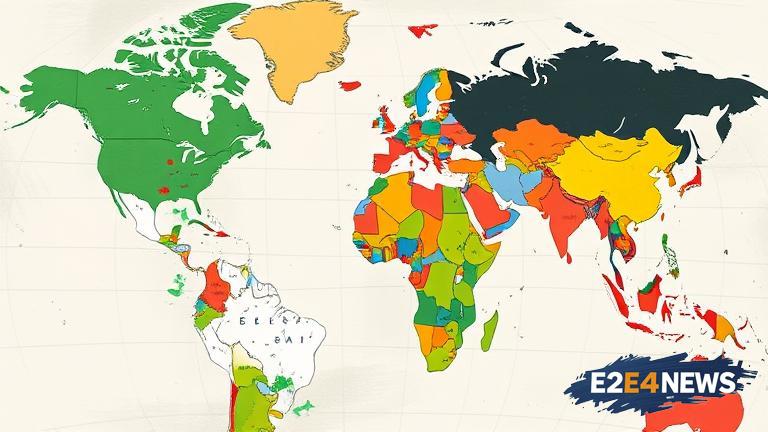The global trade landscape is becoming increasingly complex, with several countries struggling to reach agreements with their counterparts. Despite the importance of trade in driving economic growth, many nations have been unable to come to terms, leaving their economies in a state of uncertainty. The United States, for example, has been engaged in a prolonged trade dispute with China, with both countries imposing tariffs on each other’s goods. The European Union, meanwhile, has been trying to negotiate a trade deal with the UK, but the talks have been slow-going. Other countries, such as Japan and South Korea, have also been struggling to reach trade agreements with their neighbors. The lack of progress on trade agreements has significant implications for businesses and consumers around the world. Companies that rely on international trade are facing increased uncertainty and costs, which can impact their bottom line. Consumers, meanwhile, may face higher prices and reduced access to certain goods. The stalemate on trade agreements is also having a broader impact on the global economy, contributing to a slowdown in growth and increased volatility in financial markets. The World Trade Organization (WTO) has been working to facilitate trade talks and provide a framework for countries to negotiate agreements. However, the organization faces significant challenges, including the rise of protectionism and the increasing complexity of global trade. Despite these challenges, many experts believe that trade agreements are essential for promoting economic growth and reducing poverty. They argue that trade agreements can help to increase access to new markets, reduce tariffs and other trade barriers, and promote economic development. However, others argue that trade agreements can also have negative consequences, such as job losses and environmental degradation. The debate over trade agreements is complex and multifaceted, with different countries and interest groups having different perspectives. In recent years, there has been a growing trend towards protectionism, with some countries imposing tariffs and other trade barriers to protect their domestic industries. This trend has been driven in part by concerns about job losses and economic inequality. However, many experts believe that protectionism is not an effective way to promote economic growth or reduce inequality. Instead, they argue that countries should focus on negotiating trade agreements that promote fair trade and reduce trade barriers. The US-China trade dispute is a notable example of the challenges of negotiating trade agreements. The two countries have been engaged in a prolonged trade war, with both sides imposing tariffs on each other’s goods. The dispute has had significant implications for businesses and consumers in both countries, with many companies facing increased costs and uncertainty. The EU-UK trade talks are another example of the challenges of negotiating trade agreements. The two sides have been struggling to reach a deal, with significant implications for businesses and consumers in both the EU and the UK. The lack of progress on trade agreements is a major concern for many countries, with significant implications for economic growth and development. In order to promote trade and economic growth, countries must be willing to negotiate agreements that promote fair trade and reduce trade barriers. This will require a commitment to cooperation and a willingness to compromise, as well as a recognition of the benefits of trade for all countries involved. Ultimately, the ability to negotiate trade agreements will be critical for promoting economic growth and reducing poverty around the world. By working together and promoting fair trade, countries can help to create a more prosperous and equitable global economy. The global trade landscape is constantly evolving, with new challenges and opportunities emerging all the time. As countries continue to navigate the complexities of global trade, it is essential that they prioritize cooperation and negotiation, rather than protectionism and conflict. By doing so, they can help to promote economic growth, reduce poverty, and create a more prosperous and equitable world for all. The importance of trade agreements cannot be overstated, as they have the potential to drive economic growth, create jobs, and reduce poverty. However, the negotiation of trade agreements is a complex and challenging process, requiring cooperation, compromise, and a commitment to fair trade. As the global trade landscape continues to evolve, it is essential that countries prioritize the negotiation of trade agreements, rather than relying on protectionism and tariffs. By working together and promoting fair trade, countries can help to create a more prosperous and equitable world for all. The benefits of trade agreements are numerous, including increased access to new markets, reduced tariffs and other trade barriers, and promoted economic development. However, the negotiation of trade agreements is not without its challenges, including the risk of job losses and environmental degradation. Despite these challenges, many experts believe that trade agreements are essential for promoting economic growth and reducing poverty. The US, EU, Japan, and South Korea are among the countries that have been struggling to reach trade agreements, with significant implications for their economies. The lack of progress on trade agreements is a major concern for many countries, with significant implications for economic growth and development. In order to promote trade and economic growth, countries must be willing to negotiate agreements that promote fair trade and reduce trade barriers. This will require a commitment to cooperation and a willingness to compromise, as well as a recognition of the benefits of trade for all countries involved. The global trade landscape is constantly evolving, with new challenges and opportunities emerging all the time. As countries continue to navigate the complexities of global trade, it is essential that they prioritize cooperation and negotiation, rather than protectionism and conflict. By doing so, they can help to promote economic growth, reduce poverty, and create a more prosperous and equitable world for all.
